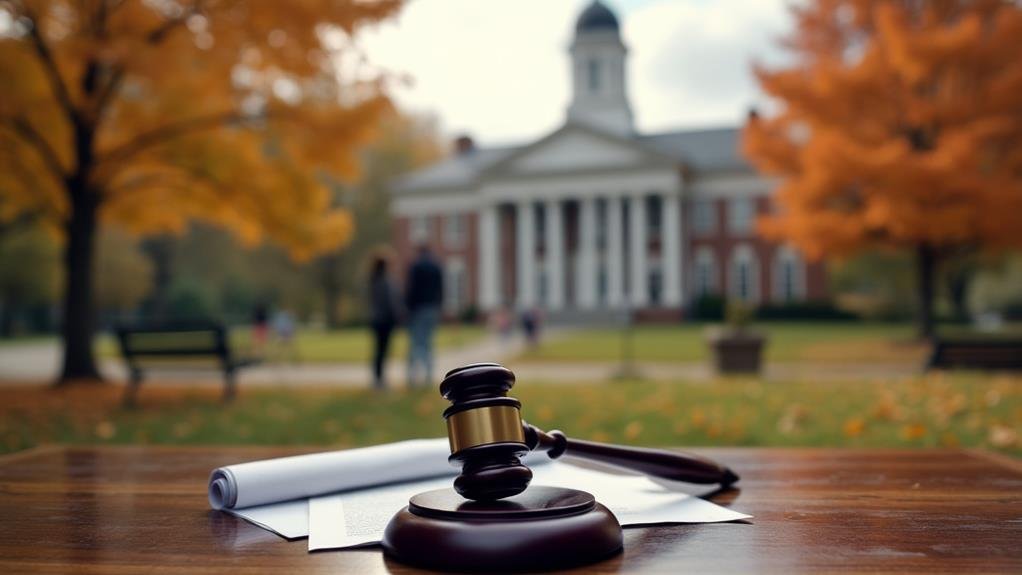Exploring New Jersey’s probate process smoothly involves several key steps. Initially, verification of the deceased’s will through the Surrogate’s Court is crucial. Executors should gather important documents like the original will and a certified death certificate. They manage estate assets, settle debts, and guarantee fair asset distribution.
Estates valued under $50,000 can use streamlined procedures, reducing court involvement and legal fees. Seeking advice from legal experts and utilizing county resources, such as the Morris County Surrogate Court, can simplify the process. By focusing on these areas, one ensures a more efficient and less stressful probate experience, and there’s more to investigate for a thorough understanding.
Understanding the New Jersey Probate Process
Understanding the New Jersey probate procedure reveals its crucial role in facilitating the transfer of property after an individual’s death. The New Jersey Surrogate’s Court supervises this process, which encompasses several key stages. First, the verification of the deceased’s will is essential. This action validates the document, confirming it accurately represents the deceased’s intentions. Additionally, it’s important to recognize that probate may not be necessary in certain cases, such as when assets are managed in a trust or transferred directly to heirs, as outlined in probate exemptions.
Following this, the appointed executor takes charge of the estate. This individual is responsible for assessing property values, settling outstanding debts, and managing tax obligations. Executors play a vital role in maintaining order and ensuring all responsibilities are fulfilled before assets are allocated to heirs. Probate strategies indicate that meticulous estate planning can simplify this process, alleviating burdens for surviving relatives.
Furthermore, not every asset must undergo probate. Nonprobate properties, such as joint tenancy holdings and insurance payouts, can be directly distributed to beneficiaries. New Jersey probate regulations also provide a streamlined process for smaller, uncomplicated estates, making the procedure faster and more affordable. In such instances, an affidavit submitted to the court may be sufficient.
Grasping these elements of New Jersey probate underscores the importance of comprehensive estate planning, ensuring that property transitions smoothly and efficiently to rightful beneficiaries.
Gathering Essential Documents
After acknowledging the significance of the probate procedure, the next essential action involves collecting the required documentation for advancement. To ensure a seamless process, it is crucial to obtain the original testament, a certified copy of the death certificate, and a comprehensive list of the decedent’s assets. Additionally, familiarizing oneself with New Jersey probate regulations can clarify the expectations and requirements throughout this procedure.
The original testament is a key document detailing the decedent’s intentions and designating the executors tasked with overseeing the estate. In the absence of this document, the probate court may encounter delays in appointing an executor, complicating the overall procedure.
A certified copy of the death certificate is equally vital. This document officially verifies the passing, enabling the initiation of probate proceedings. It is typically acquired from the vital records office in the county where the death transpired.
A detailed inventory of the decedent’s assets is essential for assessing the estate’s worth. This inventory should encompass real property, bank accounts, investments, personal belongings, and other significant assets. A clear and thorough inventory not only aids inequitable distribution among heirs but also assists in identifying and resolving any outstanding debts or taxes.
Collecting these documents promptly can significantly expedite the probate process, ensuring a smoother, more efficient progression for all parties involved.
Roles and Responsibilities of Executors
Executors hold a vital position in the New Jersey probate proceedings, overseeing the deceased individual’s estate and ensuring assets are allocated according to the will or applicable state statutes. Appointed by the Surrogate Court, they bear a fiduciary responsibility to act in the estate’s and beneficiaries’ best interests. Grasping the probate journey is essential for executors as they fulfill their duties efficiently.
Executors must collect and catalog all assets, including real estate properties, bank accounts, and personal belongings. They are tasked with settling outstanding debts and tax obligations using the estate’s resources, ensuring all financial commitments are fulfilled prior to asset distribution to beneficiaries. This role demands meticulous record-keeping and openness to foster trust and prevent conflicts.
Effective communication is crucial, as executors must keep beneficiaries, creditors, and the Surrogate Court updated on the estate’s status. They must also ensure adherence to New Jersey regulations, which may include submitting required paperwork and participating in court sessions.
Utilizing Simplified Probate Procedures
The probate process in New Jersey can often be simplified when families deal with small estates valued under $50,000. This streamlined approach helps families navigate the legal system more easily, resulting in quicker resolutions. The simplified probate process is particularly suited for small estates without conflicts among heirs or beneficiaries, thus reducing both time and costs compared to traditional probate.
For eligible estates, the streamlined procedure involves submitting an affidavit to the surrogate’s court, which decreases the number of required court appearances and minimizes paperwork. This efficient method allows families to concentrate on supporting each other instead of becoming overwhelmed by complex legalities.
Here’s a brief comparison of the two processes:
| Traditional Probate | Simplified Probate | Key Differences |
|---|---|---|
| Lengthy court supervision | Minimal court involvement | Greater efficiency |
| Extensive paperwork | Reduced paperwork | Simplicity of process |
| Higher legal fees | Lower legal fees | Improved financial accessibility |
Families with smaller estates can greatly benefit from this simplified method, as it significantly reduces administrative burdens. By understanding and utilizing these efficient procedures, they can ensure a smoother experience during a difficult time.
Seeking Legal and County Resources
Navigating the probate system in Morris County, NJ, can be simplified with the right legal and county assistance. Familiarity with the New Jersey Probate Overview is essential for executors and administrators, ensuring they can effectively handle estate management responsibilities, which brings reassurance to everyone involved.
Legal firms in Morris County, like Capita Law LLC, provide free consultations for tailored advice on probate issues. Consulting with attorneys who focus on elder law and estate planning offers valuable insight, helping to maneuver through the intricacies of probate. These experts aid in asset collection, debt settlement, and property distribution to beneficiaries, promoting a seamless process.
County institutions, particularly the Morris County Surrogate Court, are vital for facilitating the probate procedure. The Surrogate Court oversees the appointment of executors or administrators and communicates with heirs and beneficiaries. Executors can rely on the court’s resources to manage estate assets, fulfill tax obligations, and finalize the estate efficiently.
Community support services are also available, specifically designed for executors and administrators. These programs enhance the estate management process, providing essential aid throughout the probate journey. By accessing and leveraging these legal and county resources, individuals can ensure a more straightforward and effective probate experience in Morris County, NJ.
FAQs
Is Probate Difficult in New Jersey?
Probate in New Jersey can be challenging due to legal procedures and court oversight. Executors need to adhere to specific guidelines, manage deadlines, and address potential disputes. Seeking professional advice helps guarantee a smooth, efficient process for all involved.
How to Avoid Probate in New Jersey?
To avoid probate in New Jersey, one should establish a revocable living trust, designate beneficiaries on accounts, use joint ownership with rights of survivorship, create payable-on-death accounts, and consider lifetime gifting to reduce estate value.
How Long Does the Probate Process Take in New Jersey?
The probate process in New Jersey typically takes 9 to 12 months. Factors like estate complexity, disputes, and court schedules can affect this timeline. Efficient planning and legal guidance can help serve families by ensuring a smoother process.
What Assets Are Exempt From Probate in Nj?
In New Jersey, assets exempt from probate include joint tenancy property, life insurance, retirement accounts with named beneficiaries, POD bank accounts, TOD securities, and assets in revocable living trusts. Understanding these exemptions aids in serving beneficiaries effectively.









